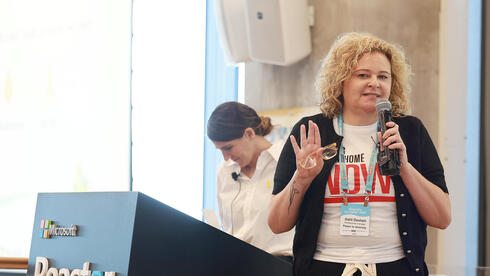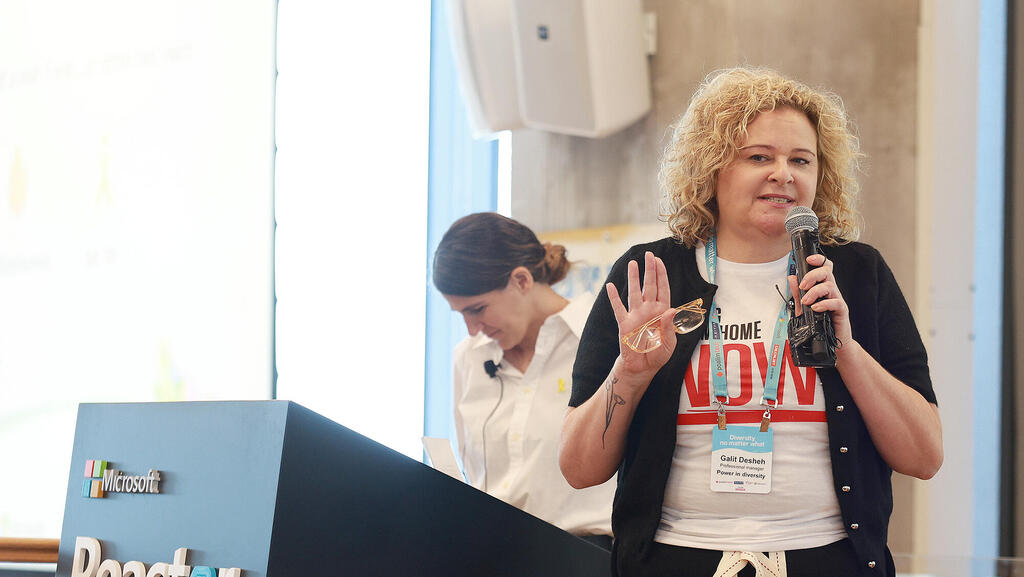
The diversity report: More women in high-tech, less in senior positions
Dr. Galit Desheh, the professional director of Power in Diversity, presented the diversity report at the organization's conference, which shows that while the diversity initiatives may be effective in increasing the general presence of women, they do not adequately deal with the challenges that women experience in leadership. And who are the leading companies in employee diversity?
"In 2023, the slogan was 'Israeli Tech No Matter What,' and we had no idea what we were in for," said Dr. Galit Desheh, the professional director of Power in Diversity, while revealing the diversity report of the Israeli startup industry at the Power in Diversity conference. "The goal was to keep moving forward quickly. Even this industry, which thrives on instability and ups and downs, could not have imagined what awaited us."
In 2023, the high-tech industry in Israel faced both internal and external challenges after a decade of growth and resilience. Following a year of protests against judicial reforms, these challenges intensified on October 7 with the outbreak of war. In many companies, 30% of the workforce was called into the IDF reserves. However, the industry quickly adapted, redirecting its technologies to support national needs while maintaining relationships with global investors.
The collective trauma continued to affect the industry, marked by the loss among key figures and deepening ideological divides. Nevertheless, the high-tech sector mobilized rapidly. Professionals adapted technologies to support national efforts, assisted in locating abductees, and raised funds. Startups modified their tools to coordinate evacuations and provide crisis support, while drone companies and venture capital funds donated military equipment and supplies to Israel.
Despite widespread calls for reserve service, CEOs continued to promote their businesses, holding meetings with potential clients and investors. For many, leaving Israel became nearly impossible, especially for those called up for active reserve duty.
Undoubtedly, 2023 was a year of extraordinary challenges for Israel and its high-tech industry. The war, along with personal and national traumas and the struggle to preserve democracy, posed unprecedented difficulties. However, diversity and inclusion remain essential tools for navigating these tumultuous times, offering stability and promoting progress.
The report, based on data from 841 venture capital-backed startups and public companies, highlights key diversity indicators such as gender representation and the involvement of Arab and ultra-Orthodox (Haredi) individuals, along with leadership dynamics. While the representation of women in technical roles has improved slightly, barriers persist for aspiring women. Despite the increase in the number of women in the workforce, a noticeable gap remains between the number of women in the industry and those holding management positions. Additionally, the representation of Arabs and Haredim remains low in most companies.
A report presented last year, covering data from 2023, showed changes in the Israeli high-tech landscape. After five years of rapid growth, including during the COVID-19 crisis, the sector experienced a slowdown in 2022, marked by layoffs and growing concerns about a continuing shortage of skilled labor. However, the startup sector has continued to innovate, even as this shortage remains a significant challenge.
This is the third year that the survey has examined the presence of women in the Israeli startup industry, and since last year, the presence of ultra-Orthodox and Arabs has also been included. "Counting people is a complex task, and even more complex is counting identities," says Desheh. "Counting women is relatively simpler. This year, we teamed up with Dealigence, which helped us collect the data. This independent collection is then validated. We gathered data on gender, positions within companies, senior management, and more."
The report indicates a continued increase in the representation of women in the workforce, especially in technology fields. The data reflect a growing commitment to gender diversity, with improvements seen year after year. At the same time, there has been a decrease in the representation of women in senior positions (C-level roles). Despite overall progress, the leadership pipeline is not improving at the same rate, indicating deep-rooted issues that prevent women from reaching or remaining in leadership positions. This situation may harm organizational diversity in decision-making and innovation at the highest levels.
The gap between overall growth and representation in senior positions suggests that while diversity initiatives may effectively increase the overall presence of women, they do not adequately address the challenges women face in leadership. Targeted programs focusing on mentoring, career advancement, and breaking down barriers to leadership for women will be essential to reversing this trend and ensuring more equal representation at the senior management level.
Among large companies (300 employees or more), the top spots in employee diversity were awarded to Hello Heart in first place, Papaya Global in second, HiBob in third, Guesty in fourth, and Minute Media in fifth. In companies with 100-299 employees, the rankings were HoneyBook in first place, Nanit in second, Eleos in third, Snappy in fourth, and CytoReason in fifth. For companies with 50-99 employees, Airdoctor took first place, followed by Antidote in second, Confetti in third, Sensi AI in fourth, and Homez in fifth. Among smaller companies (29-49 employees), Siteaware came in first, Monto second, Parametrix third, Seemplicity fourth, and Sweet fifth. Among public companies, Fiverr led in employee diversity, followed by Riskified in second, Lemonade in third, Kaltura in fourth, and JFrog in fifth.














